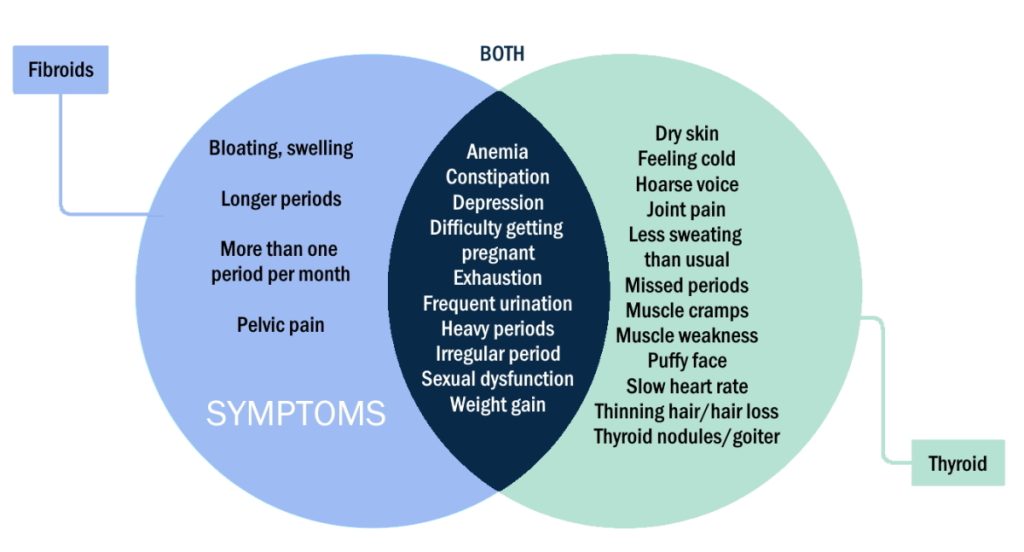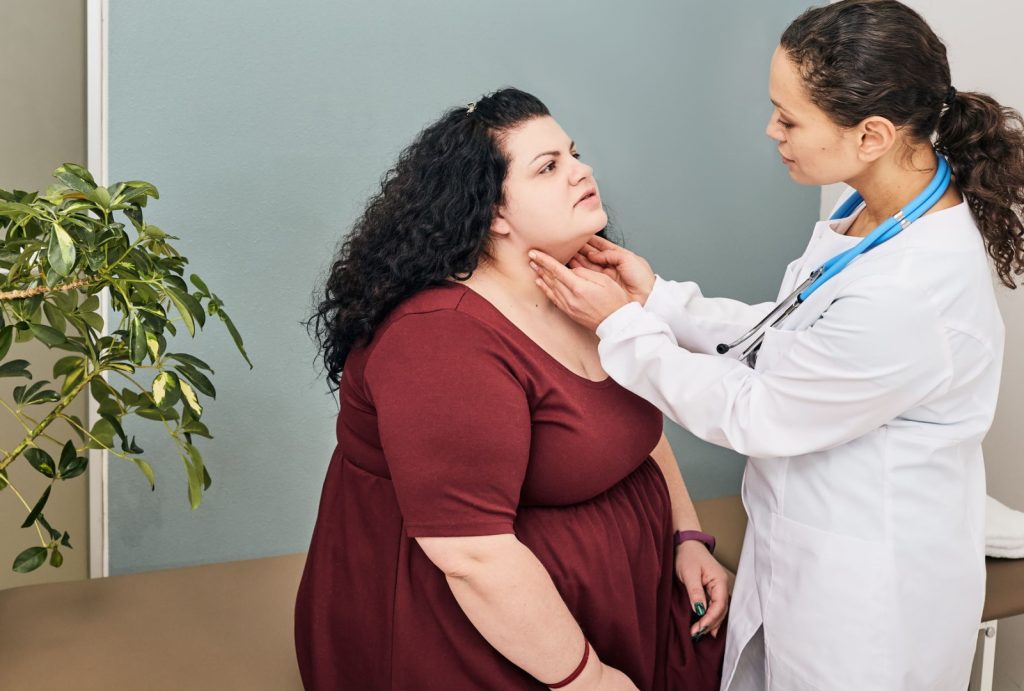Ever since she reached her 30’s, Leslie* felt like something was not quite right inside her body. She cited symptoms such as weight gain, cold sensitivity, and fatigue. These symptoms developed slowly over the years, so it was hard to pinpoint the exact cause. Thankfully, she finally got her answer when she was diagnosed with hypothyroidism. But now, another problem exists: Leslie is also experiencing the symptoms of uterine fibroids. Her gynecologist confirmed this at her last appointment. Her doctor also explained having both hypothyroidism and fibroids isn’t a surprise.
For starters, fibroids are the most common non-cancerous tumor in the female reproductive system. Researchers estimate 70-80% of all women develop fibroids between the ages of 35 and 54. They also can occur in women younger than 35 and until menopause. Fibroids are made of smooth muscle cells and fibrous connective tissue. They develop in the uterus, tend not to stay the same size, and can also increase in quantity.
We know that fibroids are under hormonal control—especially estrogen. And since thyroid disorders lead to hormonal imbalances, it only makes sense that women with hypothyroidism are three times more likely to have fibroids, especially larger fibroids.
Hypothyroidism and Fibroids: An Overview

What is a thyroid exactly? The thyroid is a butterfly-shaped gland in your neck responsible for producing hormones. When working correctly, these thyroid hormones control many activities in your body. This includes heart rate, body temperature, breathing, menstrual cycles, your central and peripheral nervous systems, and more. When it isn’t working correctly, it can either make more thyroid hormones than your body needs (hyperthyroidism) or not enough (hypothyroidism). Other thyroid problems include goiter, an enlargement of the thyroid gland, lumps or nodules in the thyroid gland, and thyroiditis (swelling).
Hypothyroidism, also referred to as an under-active thyroid, is of particular concern for women. One in 8 women will develop thyroid problems during her lifetime. Hypothyroidism symptoms may not be noticeable at first. Over time, however, they can cause several health problems, including:
- Heavy and irregular periods
- Weight gain
- Joint pain and muscle weakness
- Increased sensitivity to cold
- Fatigue
- Dry skin
- Constipation
- Infertility

Hypothyroidism and fibroids together are also a major concern. Here’s why: According to the Office on Women’s Health, estrogen and progesterone stimulate the development of the uterine lining during each menstrual cycle in preparation for pregnancy (especially estrogen). For women with fibroids, this causes their fibroids to grow and vary from the size of a bean to a melon. Most clinicians believe uterine fibroids shrink when a woman goes through menopause, which stands to reason since this is a period during which hormone levels are lower. However, women of reproductive age need thyroid hormones to maintain hormonal balance and to ovulate and make progesterone.
Hypothyroidism throws everything off, forcing the body to create more estrogen to account for low progesterone—leading to further fibroid growth. Not all fibroids are painful. But their size, growth rate, and location can lead to problems, as the sheer weight and location of fibroids force them to press against internal organs and nerves.
Who Is More at Risk for Hypothyroidism?
When it comes to hypothyroidism and fibroids, it’s helpful to look at who is more susceptible to hypothyroidism. Understanding your risk factors helps your doctor determine your need to be screened for hypothyroidism.
- Women — Women are more likely than men to have thyroid diseases such as hypothyroidism, especially right after pregnancy and after menopause or if they’ve had thyroid problems before.
- Underlying conditions — Conditions such as Type 1 diabetes or rheumatoid arthritis can make you more susceptible to hypothyroidism. You could also be experiencing negative effects from radiation treatment of the thyroid.
- Family history — Thyroid disease and fibroids run in many families. So, if your grandmother or mother suffered from hypothyroidism and fibroids, then you are more at risk of following in their footsteps.
- Age — Hypothyroidism is very common in patients over 60 and steadily increases with age. But young people can have it, including kids. Some are born with it while others develop it late in childhood or as teenagers.
- Thyroid surgery — If you had surgery on your thyroid to treat cancer or symptomatic goiters, your risk is higher.
Hypothyroidism and Fibroids: What Should I Do Now?
If you’ve been diagnosed with both hypothyroidism and fibroids, it is important that you and your doctor keep a close eye on your ongoing symptoms and discuss the right treatment options for your unique situation. Hypothyroidism medicine provides your body with the thyroid hormones it needs to work normally and limit hormone imbalances. It is possible that you will need to continue taking this medication for the rest of your life along with regular follow-up appointments with your doctor.

The good news is that hypothyroidism is a very treatable condition. There are lifestyle steps you can take that can help with both hypothyroidism and fibroids:
Choose your eating habits carefully
Eat more fruits, especially citrus, and vegetables. Eating a lot of red meat (e.g., beef) and sugary foods are linked to a higher risk of uterine fibroids. This also leads to weight gain, and according to the U.S. Office on Women’s Health, the risk for heavy women is two to three times greater than average. A healthy BMI, or Body Mass Index, is between 18.5 and 25.
Get more exercise
While you want to avoid engaging in intense or vigorous exercises such as bending and heavy lifting, lighter routines such as yoga, swimming, biking, walking, light weight training, and stretching can boost endorphins, relieve stress, improve your mood, and act as natural painkillers.
Manage stress
Stress is the body’s biochemical response to life challenges. To handle stress, the brain tells our body to produce extra hormones. As a result, hormone levels rise, which stimulates fibroid growth and causes symptoms to flare up.
Consider UFE for Fibroid Treatment
The thought of going through fibroid surgery can create stress and fear of the unknown. How long will the recovery be? How will my body react? Is it safe? Will I be in pain? In some cases, fibroid surgery is the recommended treatment option. However, there is also an effective and minimally invasive fibroid treatment option called Uterine fibroid embolization (UFE). UFE does not technically remove uterine fibroids in the way a hysterectomy does. But it is more than 90% effective in relieving the fibroid symptoms by cutting off blood flow to all fibroids, causing them to shrink and die.
At Fibroid Institute, UFE is performed through the radial artery, at your wrist. Our fibroid doctors use X-ray guidance to locate the vessels that supply blood to your fibroids. They then inject small particles into the vessels, blocking the blood flow to the fibroids, causing them to shrink and die. The procedure will last about one hour, and you will be asleep for the procedure.
Advantages of UFE at Fibroid Institute
- Covered by most major medical insurance
- No hospital stay
- Treat multiple fibroids at once
- No incision or vaginal access, just a small puncture on your wrist
- Recovery period is as little as one week
- Over 90% effective in reducing symptoms
Experiencing Fibroids with Hypothyroidism? Call Fibroid Institute
If you’re already living with hypothyroidism and now discover you have fibroids, or vice versa, we understand it can be overwhelming. The best way to ease your concerns, get your questions answered, and find treatment options that work best for you is to have an open conversation with your doctor. The good news is hypothyroidism is treatable and there are alternatives to fibroid surgery.
Uterine fibroid embolization (UFE) is the gold standard in non-surgical fibroid treatment. Rather than a hospital stay, UFE is a same-day outpatient procedure. In fact, at Fibroid Institute we offer UFE to patients in the comfort of our Houston and Dallas fibroid clinics, equipped with advanced medical technology.
The specialized team at Fibroid Institute, with experienced Dallas and Houston fibroid doctors, have helped thousands of women discover the joys of living fibroid free. With each UFE procedure, patients are empowered to achieve their full potential without being limited by fibroid symptoms. For many women, the UFE procedure changed their lives. At Fibroid Institute, we are dedicated to helping you become #FibroidFree.
Request a free 10-15 minute phone screening to determine if you are eligible. After the screening, if you qualify for UFE, you can schedule your onsite or telehealth consultation. Most major medical insurance providers cover the cost of UFE.
Call for an appointment with Fibroid Institute Dallas at 214-838-6440 or with Fibroid Institute Houston at 713-903-3733 or complete the form below.
Fibroid Institute Texas serves the Dallas and Houston areas including Highland Park, University Park, Park Cities, Garland, Mesquite, Richardson, Dallas, Sherman, Houston, Sugar Land, Katy, Webster, Clear Lake, The Woodlands, Universal City, Spring, Kingwood, Stafford, Conroe, Texas City, Cypress, League City, Bellaire, Addison, Carrollton, Plano, Frisco, McKinney, Allen, Fort Worth, Grand Prairie, HEB, Arlington, Hutchins, Irving, Duncanville, DeSoto, Cedar Hill, Lancaster, Cockrell Hill, and more.
Prior to starting any new treatment or if you have questions regarding a medical condition, always seek the advice of your doctor or other qualified health provider. This information is not a substitute for professional medical advice.
*Patient stories are true. Names and/or photos may be changed to protect patient confidentiality.

